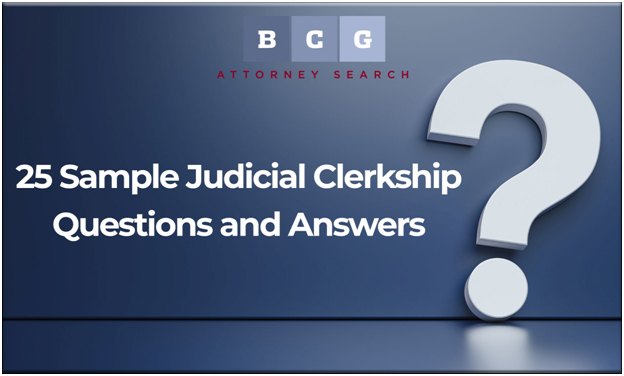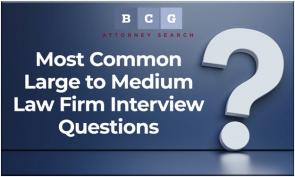
- Explain your interest in trying to secure a clerkship.
Do's: Emphasize your interest in learning and growing as a legal professional. Describe how a clerkship will help you achieve your career goals.
Don'ts: Don't appear as if you're only interested in a clerkship for its prestige or as a stepping stone to a higher-paying job. Refrain from downplaying the importance of learning and growth in your legal career.
- What are your particular interests in seeking a clerkship with me?
Do's: Show that you have researched the judge's background and opinions. Emphasize what aspects of the judge's work align with your values and career goals.
Don'ts: Don't appear to be applying to work with the judge for superficial reasons. Refrain from downplaying the importance of the judge's work or suggesting that you need to become more familiar with it.
- Do you think a one-year term is long enough to make the job worthwhile? Explain.
Do's: Show that you are open-minded and flexible about the clerkship length. Emphasize your belief in the value of a clerkship, regardless of its length.
Don'ts: Don't suggest that a one-year term is too short or not worthwhile. Don't appear inflexible or unwilling to work within the judge's parameters.
- What are the particular aspects of a clerkship you would value?
Do's: Show that you have thought about what you would gain from a clerkship. Emphasize your interest in learning and growth as a legal professional.
Don'ts: Don't suggest that you're only interested in a clerkship for its prestige or as a stepping stone to a higher-paying job. Don't downplay the importance of learning and growth in your legal career.
- How far have you progressed in developing your writing skills?
Do's: Show that you are confident in your writing skills and open to feedback and improvement. Emphasize your commitment to developing your writing skills throughout your legal career.
Don'ts: Don't appear overconfident in your writing skills or suggest you have nothing to learn. Don't downplay the importance of feedback and improvement in your legal career.
- How valuable do you consider law review work in preparing you for a judicial clerkship?
Do's: Show that you value the skills developed through law review work and recognize that other legal experiences can be equally valuable. Emphasize the transferability of skills developed through law review to a clerkship setting.
Don'ts: Don't suggest that law review work is the only way to prepare for a clerkship. Refrain from downplaying the importance of other legal experiences or suggesting that they are less valuable.
- Have you looked into, and if so, what have you discovered about the reputation of the judges to whom you are applying for a clerkship?
Do's: Show that you have researched the judges and understand their reputation and working style. Emphasize your interest in working with the judge and learning from their experience.
Don'ts: Don't suggest that you have not researched the judges or their reputation. Don't downplay the importance of researching the judge's reputation and working style.
- What judges have you particularly admired because of style, substance, or ideology?
Do's: Show that you have thought about what qualities you admire in a judge. Emphasize your interest in learning from judges who share those qualities.
Don'ts: Don't suggest that you have not thought about what qualities you admire in a judge. Don't downplay the importance of researching judges and understanding their qualities.
- How important to you are the political views of the judges?
Do's: Show that you value impartiality and fairness in a judge. Emphasize your ability to work effectively with judges who may have different political views than your own.
Don'ts: Don't appear as if you're overly concerned about the political views of judges. Don't suggest that you are unwilling or unable to work with judges with different political views.
- What do you think of merit selection in the federal and state judiciary? Do you know how it is supposed to work?
Do's: Show that you have thought about the pros and cons of merit selection. Emphasize your understanding of how the process works and its potential benefits.
Don'ts: Don't suggest that you have not considered the pros and cons of merit selection. Don't downplay the importance of understanding how the process works.
- Do you approve efforts to provide machinery to remove federal judges guilty of misbehavior? In your opinion, would it infringe upon the independence of the judiciary?
Do's: Show that you value the importance of accountability while also recognizing the need to preserve the independence of the judiciary. Emphasize the importance of a fair and impartial process.
Don'ts: Don't appear as if you're overly concerned about the independence of the judiciary or suggest that accountability is unimportant. Refrain from downplaying the importance of a fair and impartial process.
- Under what obligation is a judge to help a law clerk find another job at the end of the term?
Do's: Show that you appreciate the potential value of a judge's assistance in finding another job at the end of a clerkship term.
Don'ts: Don't suggest that a judge must help a law clerk find another job at the end of the term. Refrain from appearing as if you're overly reliant on a judge's assistance in finding another job.
- How can we improve the administration of justice?
Do's: Show that you are committed to improving the administration of justice and offer specific ideas for how to do so.
Don'ts: Don't suggest that there are no ways to improve the administration of justice. Don't downplay the importance of addressing access to legal representation issues or promoting diversity in the judiciary.
- How conversant are you with significant current United States Supreme Court decisions? Do you read U.S. Law Week?
Do's: Show that you understand the importance of staying current on legal developments and have taken steps to stay informed.
Don'ts: Don't suggest that you are unfamiliar with recent Supreme Court decisions or downplay the importance of staying current on legal developments.
- What motivated you to apply for a judicial clerkship?
Do’s: Emphasize your genuine interest in the legal field and your passion for working in a fast-paced and challenging environment. Explain how a clerkship aligns with your career goals and how it can help you gain valuable experience and exposure to different areas of the law.
Don'ts: Mention any personal or financial reasons for applying, such as needing a job or increasing your income. Avoid sounding insincere or lacking motivation.
- What are the essential qualities of a successful judicial clerk?
Do’s:Highlight your relevant skills and qualities, such as attention to detail, strong writing and research skills, organization, and the ability to work well under pressure. Emphasize your adaptability, flexibility, and ability to learn quickly.
Don'ts:Make exaggerated claims or list generic qualities that don't relate to the position. Avoid sounding arrogant or overconfident.
- What are your strengths as a legal researcher and writer?
Do’s:Provide specific examples of your experience and achievements, such as writing a winning brief or conducting thorough and complex research. Emphasize your ability to communicate complex ideas clearly and persuasively.
Don'ts:Be vague or make general statements without providing any evidence. Avoid listing generic strengths that don't demonstrate your expertise.
- Can you tell us about a particularly challenging case you have worked on and how you handled it?
Do’s:Provide a specific example of a difficult situation you faced and how you approached it. Emphasize your problem-solving skills, creativity, and ability to work as a team.
Don'ts:Discuss a case that is confidential or unethical. Avoid complaining or blaming others for the challenges you face.
- How do you stay organized and manage your workload effectively?
Do’s:Explain your strategies for staying organized and on top of your tasks, such as using a to-do list, setting priorities, and delegating responsibilities when necessary. Emphasize your ability to meet deadlines and handle multiple tasks simultaneously.
Don'ts:Mention any negative habits or tendencies that could hinder your ability to perform well in the role. Refrain from sounding disorganized or unreliable.
- What do you consider to be your greatest accomplishment in the legal field so far?
Do’s:Highlight a significant achievement demonstrating your skills and experience, such as winning a case, writing a successful brief, or being recognized for your contributions. Emphasize your pride and satisfaction in your accomplishment.
Don'ts:Brag or make exaggerated claims about your achievements. Avoid discussing accomplishments that are not relevant to the position.
- What is your approach to working with a judge, and how do you handle conflicting opinions or ideas?
Do’s:Emphasize your ability to work collaboratively and respectfully with a judge and others, and explain how you handle differing opinions or ideas professionally and effectively.
Don'ts:Criticize or express negative opinions about judges or the legal system. Avoid sounding confrontational or inflexible.
- How do you stay current with the latest law and legal trends?
Do’s:Explain your strategies for staying informed and knowledgeable, such as reading legal publications, attending seminars and conferences, and participating in online discussions and forums. Emphasize your commitment to continuous learning and professional development.
Don'ts:Mention any negative habits or tendencies that could hinder your ability to perform well in the role. Refrain from sounding disinterested or lacking motivation.
- Can you tell us about a time when you had to make a difficult ethical decision in a legal setting?
Do’s:Provide a specific example of your dilemma and how you approached it. Emphasize your commitment to ethical principles and your ability to make tough decisions based on your values.
Don'ts:Discuss a situation that is confidential or unethical. Avoid sounding unprofessional or lacking integrity.
- How do you handle stressful or challenging situations in a fast-paced work environment?
Do’s:Explain specific strategies for dealing with stress and pressure, such as taking breaks, seeking colleague support, or practicing mindfulness. Emphasize your ability to remain calm and focused under pressure.
Don'ts:Mention any negative habits or tendencies that could hinder your ability to perform well in the role. Avoid sounding overly sensitive or unable to handle stress.
- Why would you be a good fit for this judicial clerkship position?
Do’s:Emphasize your relevant skills, experience, passion for the legal field, and enthusiasm for working in a challenging and rewarding environment. Explain how your background and qualities align with the requirements of the position and the values of the judge.
Don'ts:Make exaggerated claims or list generic qualities that don't relate to the position. Avoid sounding insincere or lacking motivation.
Conclusion
Legal interviews can be challenging, but with the right preparation, you can set yourself apart from other candidates and impress your interviewer. By understanding what interviewers are looking for and crafting thoughtful, well-reasoned answers to common interview questions, you can demonstrate your legal expertise, professionalism, and commitment to the legal profession. Whether interviewing for a law firm, a government agency, or a judicial clerkship, the key is to show that you are the right candidate for the job, with the skills, experience, and dedication needed to succeed in the legal profession.
About Harrison Barnes
No legal recruiter in the United States has placed more attorneys at top law firms across every practice area than Harrison Barnes. His unmatched expertise, industry connections, and proven placement strategies have made him the most influential legal career advisor for attorneys seeking success in Big Law, elite boutiques, mid-sized firms, small firms, firms in the largest and smallest markets, and in over 350 separate practice areas.
A Reach Unlike Any Other Legal Recruiter
Most legal recruiters focus only on placing attorneys in large markets or specific practice areas, but Harrison places attorneys at all levels, in all practice areas, and in all locations-from the most prestigious firms in New York, Los Angeles, and Washington, D.C., to small and mid-sized firms in rural markets. Every week, he successfully places attorneys not only in high-demand practice areas like corporate and litigation but also in niche and less commonly recruited areas such as:
- Immigration Law
- Workers Compensation
- Insurance
- Family Law
- Trust and Estate
- Municipal law
- And many more...
This breadth of placements is unheard of in the legal recruiting industry and is a testament to his extraordinary ability to connect attorneys with the right firms, regardless of market size or practice area.
Proven Success at All Levels
With over 25 years of experience, Harrison has successfully placed attorneys at over 1,000 law firms, including:
- Top Am Law 100 firms such including Sullivan and Cromwell, and almost every AmLaw 100 and AmLaw 200 law firm.
- Elite boutique firms with specialized practices
- Mid-sized firms looking to expand their practice areas
- Growing firms in small and rural markets
He has also placed hundreds of law firm partners and has worked on firm and practice area mergers, helping law firms strategically grow their teams.
Unmatched Commitment to Attorney Success - The Story of BCG Attorney Search
Harrison Barnes is not just the most effective legal recruiter in the country, he is also the founder of BCG Attorney Search, a recruiting powerhouse that has helped thousands of attorneys transform their careers. His vision for BCG goes beyond just job placement; it is built on a mission to provide attorneys with opportunities they would never have access to otherwise. Unlike traditional recruiting firms, BCG Attorney Search operates as a career partner, not just a placement service. The firm's unparalleled resources, including a team of over 150 employees, enable it to offer customized job searches, direct outreach to firms, and market intelligence that no other legal recruiting service provides. Attorneys working with Harrison and BCG gain access to hidden opportunities, real-time insights on firm hiring trends, and guidance from a team that truly understands the legal market. You can read more about how BCG Attorney Search revolutionizes legal recruiting here: The Story of BCG Attorney Search and What We Do for You.
The Most Trusted Career Advisor for Attorneys
Harrison's legal career insights are the most widely followed in the profession.
- His articles on BCG Search alone are read by over 150,000 attorneys per month, making his guidance the most sought-after in the legal field. Read his latest insights here.
- He has conducted hundreds of hours of career development webinars, available here: Harrison Barnes Webinar Replays.
- His placement success is unmatched-see examples here: Harrison Barnes' Attorney Placements.
- He has created numerous comprehensive career development courses, including BigLaw Breakthrough, designed to help attorneys land positions at elite law firms.
Submit Your Resume to Work with Harrison Barnes
If you are serious about advancing your legal career and want access to the most sought-after law firm opportunities, Harrison Barnes is the most powerful recruiter to have on your side.
Submit your resume today to start working with him: Submit Resume Here
With an unmatched track record of success, a vast team of over 150 dedicated employees, and a reach into every market and practice area, Harrison Barnes is the recruiter who makes career transformations happen and has the talent and resources behind him to make this happen.
A Relentless Commitment to Attorney Success
Unlike most recruiters who work with only a narrow subset of attorneys, Harrison Barnes works with lawyers at all stages of their careers, from junior associates to senior partners, in every practice area imaginable. His placements are not limited to only those with "elite" credentials-he has helped thousands of attorneys, including those who thought it was impossible to move firms, find their next great opportunity.
Harrison's work is backed by a team of over 150 professionals who work around the clock to uncover hidden job opportunities at law firms across the country. His team:
- Finds and creates job openings that aren't publicly listed, giving attorneys access to exclusive opportunities.
- Works closely with candidates to ensure their resumes and applications stand out.
- Provides ongoing guidance and career coaching to help attorneys navigate interviews, negotiations, and transitions successfully.
This level of dedicated support is unmatched in the legal recruiting industry.
A Legal Recruiter Who Changes Lives
Harrison believes that every attorney-no matter their background, law school, or previous experience-has the potential to find success in the right law firm environment. Many attorneys come to him feeling stuck in their careers, underpaid, or unsure of their next steps. Through his unique ability to identify the right opportunities, he helps attorneys transform their careers in ways they never thought possible.
He has worked with:
- Attorneys making below-market salaries who went on to double or triple their earnings at new firms.
- Senior attorneys who believed they were "too experienced" to make a move and found better roles with firms eager for their expertise.
- Attorneys in small or remote markets who assumed they had no options-only to be placed at strong firms they never knew existed.
- Partners looking for a better platform or more autonomy who successfully transitioned to firms where they could grow their practice.
For attorneys who think their options are limited, Harrison Barnes has proven time and time again that opportunities exist-often in places they never expected.
Submit Your Resume Today - Start Your Career Transformation
If you want to explore new career opportunities, Harrison Barnes and BCG Attorney Search are your best resources. Whether you are looking for a BigLaw position, a boutique firm, or a move to a better work environment, Harrison's expertise will help you take control of your future.
Submit Your Resume Here to get started with Harrison Barnes today.
Harrison's reach, experience, and proven results make him the best legal recruiter in the industry. Don't settle for an average recruiter-work with the one who has changed the careers of thousands of attorneys and can do the same for you.
About BCG Attorney Search
BCG Attorney Search matches attorneys and law firms with unparalleled expertise and drive, while achieving results. Known globally for its success in locating and placing attorneys in law firms of all sizes, BCG Attorney Search has placed thousands of attorneys in law firms in thousands of different law firms around the country. Unlike other legal placement firms, BCG Attorney Search brings massive resources of over 150 employees to its placement efforts locating positions and opportunities its competitors simply cannot. Every legal recruiter at BCG Attorney Search is a former successful attorney who attended a top law school, worked in top law firms and brought massive drive and commitment to their work. BCG Attorney Search legal recruiters take your legal career seriously and understand attorneys. For more information, please visit www.BCGSearch.com.
Harrison Barnes does a weekly free webinar with live Q&A for attorneys and law students each Wednesday at 10:00 am PST. You can attend anonymously and ask questions about your career, this article, or any other legal career-related topics. You can sign up for the weekly webinar here: Register on Zoom
Harrison also does a weekly free webinar with live Q&A for law firms, companies, and others who hire attorneys each Wednesday at 10:00 am PST. You can sign up for the weekly webinar here: Register on Zoom
You can browse a list of past webinars here: Webinar Replays
You can also listen to Harrison Barnes Podcasts here: Attorney Career Advice Podcasts
You can also read Harrison Barnes' articles and books here: Harrison's Perspectives
Harrison Barnes is the legal profession's mentor and may be the only person in your legal career who will tell you why you are not reaching your full potential and what you really need to do to grow as an attorney--regardless of how much it hurts. If you prefer truth to stagnation, growth to comfort, and actionable ideas instead of fluffy concepts, you and Harrison will get along just fine. If, however, you want to stay where you are, talk about your past successes, and feel comfortable, Harrison is not for you.
Truly great mentors are like parents, doctors, therapists, spiritual figures, and others because in order to help you they need to expose you to pain and expose your weaknesses. But suppose you act on the advice and pain created by a mentor. In that case, you will become better: a better attorney, better employees, a better boss, know where you are going, and appreciate where you have been--you will hopefully also become a happier and better person. As you learn from Harrison, he hopes he will become your mentor.
To read more career and life advice articles visit Harrison's personal blog.






